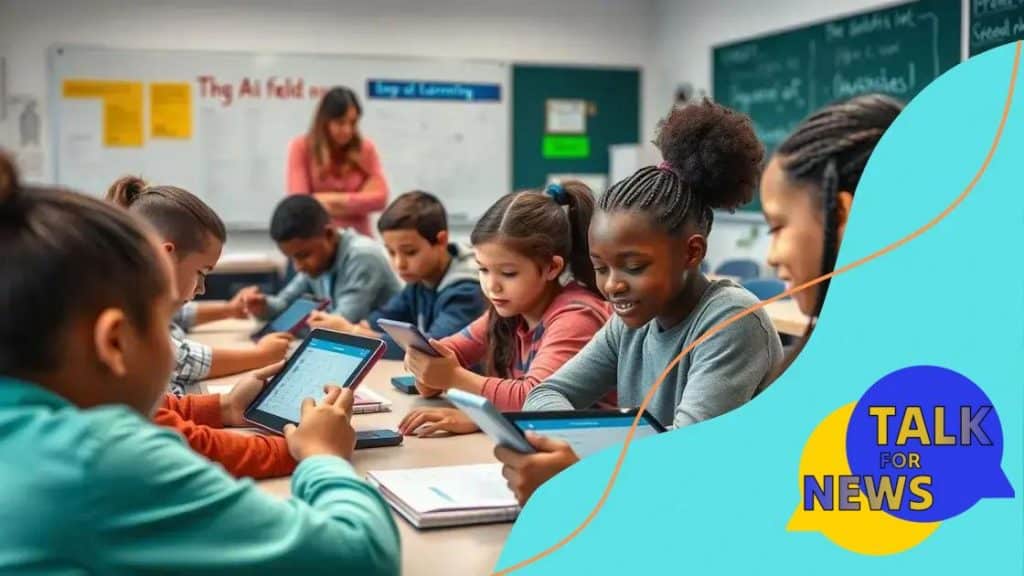How AI is revolutionizing student assessments

Anúncios
AI is revolutionizing student assessments by providing personalized learning experiences, improving grading efficiency, and offering immediate feedback while addressing challenges like data privacy and the need for infrastructure.
How AI is revolutionizing student assessments is changing the way we evaluate learning. Imagine having assessments that adapt to each student’s needs, offering personalized feedback that empowers their educational journey. Curious about how this technology is shaping classrooms today?
Anúncios
Understanding the role of AI in assessments
Understanding the role of AI in assessments is crucial for both educators and students. AI can transform traditional methods, making evaluations more effective and personalized.
Enhancing Evaluation Methods
AI streamlines the assessment process by using algorithms to analyze student performance. These systems can identify individual strengths and weaknesses, offering tailored feedback. This not only saves time for teachers but also ensures that students receive guidance that meets their unique needs.
Real-time Feedback
Anúncios
With AI-driven assessments, feedback can be instantaneous. This immediate response allows students to learn from their mistakes right away, which reinforces learning. Imagine a student a few minutes after taking a test receiving precise insights into what they got right and wrong.
Key Benefits of AI in Assessments
- Personalized assessments tailored to each student.
- Efficient grading process that reduces workload for educators.
- Data-driven insights that assist in curriculum development.
- Continuous monitoring of student progress to adjust learning strategies.
The integration of AI in education promotes fairness and equity. All students can benefit from personalized assessments that consider their learning pace. This approach encourages a growth mindset and motivates learners to engage actively in their education.
As technology continues to evolve, the possibilities for AI in assessments are endless. Educators are exploring new avenues to integrate these systems, ensuring that every student has the resources they need.
Benefits of AI for educators and students
The benefits of AI for educators and students are transforming educational environments. With AI tools available, both teachers and learners gain significant advantages.
Support for Educators
Teachers often face the challenge of managing large classes with diverse learning needs. AI addresses this by providing valuable insights that help in lesson planning and tracking student progress. Educators can utilize AI to automate administrative tasks, allowing them to focus more on teaching.
Empowering Students
For students, AI offers personalized learning experiences tailored to their individual strengths. This means that a student struggling with a particular topic can receive additional resources, while others can skip ahead. Such tailored experiences commonly result in higher engagement and understanding.
Key Benefits of AI
- Enhanced learning tools that adapt to student needs.
- Increased efficiency in grading and assessment.
- Better communication between teachers, students, and parents.
- Access to valuable data-driven insights to improve curriculum.
Moreover, the incorporation of AI in classrooms encourages critical thinking. As students interact with intelligent tutoring systems, they are prompted to solve problems creatively. This promotes a deeper understanding of the material and fosters skills that are essential in the modern world.
AI can also support students with learning disabilities, providing them tailored strategies that cater to their unique needs. This ensures inclusivity in education, helping every student to thrive.
Challenges in implementing AI assessments

While there are many advantages to using AI in education, understanding the challenges in implementing AI assessments is equally important. These challenges can impact the effectiveness of AI and its adoption within schools.
Technical Difficulties
One major challenge involves the technical requirements for AI assessments. Schools may not have the necessary infrastructure, such as high-speed internet and modern computers. Without these essentials, the implementation of AI tools can be hindered.
Data Privacy Concerns
Data privacy is another significant issue. Schools must manage sensitive information regarding students. Ensuring that data is stored securely and used ethically is crucial but can be complex. Parents and educators may have concerns about how data is monitored and utilized.
Resistance to Change
- Some educators may resist adopting AI due to a lack of familiarity with technology.
- Traditional assessment methods are deeply rooted, and changing these practices is often met with skepticism.
- Professional development is needed to help educators adjust to AI tools.
- There may be fear that AI could replace educators rather than support them.
Moreover, the cost of AI tools can be prohibitive. Investing in the necessary software and hardware might strain school budgets. This financial burden leads to disparities between affluent and less affluent districts, resulting in unequal access to quality education.
Despite these challenges, many schools are exploring solutions. By providing training for teachers and ensuring proper technical support, the transition to AI assessments can become more manageable. Ensuring that all stakeholders are informed and included in the process will create a more supportive learning environment.
Real-life examples of AI in education
Real-life examples of AI in education highlight the practical applications of technology to enhance the learning experience. Various schools and institutions are already using AI tools to improve assessments, individualized learning, and classroom management.
Personalized Learning Platforms
One notable example is the use of adaptive learning platforms such as DreamBox and Knewton. These platforms adjust their content based on a student’s performance in real time, providing personalized pathways in subjects like mathematics and reading. This tailored approach helps students grasp difficult concepts at their own pace.
AI-Powered Tutoring Systems
Another example includes AI tutoring systems like Carnegie Learning. These systems use AI algorithms to assist students outside the classroom. They provide instant feedback and personalized learning experiences, empowering students to work independently.
Automating Administrative Tasks
- School districts like Los Angeles Unified School District implement AI to streamline administrative tasks.
- AI helps in scheduling, grading, and maintaining records.
- By using AI, schools can allocate more time for teaching and improving student engagement.
Institutions are also utilizing AI to analyze student performance data. For example, Arizona State University uses AI to predict which students may need extra support. This proactive approach allows educators to intervene before students fall behind.
The application of AI in education is not only improving learning outcomes but also making learning fun and engaging. Tools that gamify learning make difficult subjects more approachable for students, fostering a love for learning.
Future trends of AI in student evaluations
The future trends of AI in student evaluations are shaping the way educational assessments are approached. As technology advances, schools are looking for innovative solutions that can enhance learning and make assessments more effective.
Enhanced Predictive Analytics
One promising trend is the use of predictive analytics. By evaluating past performance, AI systems can foresee potential challenges for each student. This enables educators to provide timely interventions before issues escalate. Understanding a student’s trajectory allows teachers to customize their teaching methods.
Integration of Virtual and Augmented Reality
Another exciting development is the integration of virtual and augmented reality in assessments. These technologies offer immersive experiences that can help assess practical skills and knowledge in real-time scenarios. For instance, medical students can perform surgical simulations, while architecture students can explore 3D models.
Key Trends to Watch
- Continuous formative assessment that adapts over time.
- Incorporation of chatbot technology for instant feedback.
- Collaborative assessments where peer reviews play a key role.
- Increased focus on soft skills evaluations alongside academic performance.
Furthermore, the accessibility of AI tools will ensure that students from various backgrounds can benefit equally. As these tools become more affordable, more schools will adopt them. This democratization of education promises to enhance learning opportunities for all.
The integration of AI assessments also emphasizes student engagement. Schools are likely to focus on gamifying assessments, making them not only educational but also enjoyable. This approach can help foster a love for learning and motivate students to actively participate in their educational journey.
In summary, the integration of AI in education is reshaping how we assess and evaluate student performance. With advancements in technology, we can offer personalized learning experiences, improve efficiency in grading, and provide immediate feedback. While there are challenges to overcome, such as data privacy and the need for proper infrastructure, the potential benefits far outweigh them. Future trends suggest that AI will continue to play a key role in enhancing educational outcomes, making assessments more engaging and effective for students and educators alike.
FAQ – Frequently Asked Questions about AI in Education
How can AI enhance personalized learning for students?
AI can tailor learning experiences to each student’s needs, adapting content and pace to improve understanding and engagement.
What are the main challenges of implementing AI in schools?
Key challenges include ensuring data privacy, obtaining the necessary technology infrastructure, and overcoming resistance to change among educators.
In what ways can AI improve the efficiency of grading?
AI can automate grading processes, allowing teachers to quickly assess student work and spend more time on instruction and support.
What future trends should we expect from AI in student assessments?
Future trends include more immersive assessments using virtual and augmented reality, continuous feedback mechanisms, and greater collaboration among students.





